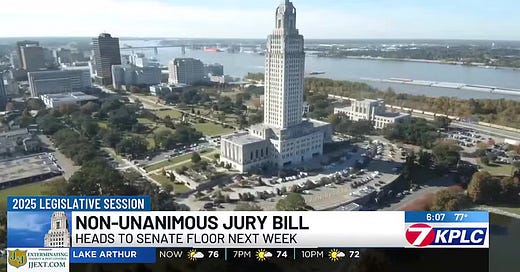Conservative Principles Demand Justice: Revisiting Louisiana’s Non-Unanimous Jury Convictions
By The Bayou Insider Staff
On May 21, the Louisiana Senate voted 26-9 against Senate Bill 218, a proposal that would have allowed individuals convicted by non-unanimous juries to petition for new trials. While many Republicans and conservatives in the legislature opposed the bill, not all conservatives agree with that stance. If we claim to believe in the Constitution, moral accountability, and the proper limits of government authority, then we must also believe that a person imprisoned by an unconstitutional process deserves a chance at justice.
🏛 Upholding Constitutional Integrity Is a Conservative Priority
The U.S. Constitution is the backbone of American conservatism. It limits government power, protects individual liberty, and ensures due process under the law. In Ramos v. Louisiana (2020), the U.S. Supreme Court ruled that non-unanimous jury convictions in felony cases violate the Sixth Amendment. This wasn’t a progressive opinion—it was a textualist one, led by Justice Neil Gorsuch and joined by the Court’s more conservative bloc.
If we believe in the original meaning and authority of the Constitution, then we should not ignore cases where its clear standards were violated. Although the Court left it to the states to determine whether to apply the ruling retroactively, the constitutional principle is unmistakable: a fair trial requires a unanimous verdict. Louisiana should not hide behind the technicality of “finalized” convictions to continue imprisoning citizens under a method now ruled invalid.
📜 Correcting Historical Injustice Honors American Values
Some conservatives recoil at the phrase “systemic injustice,” believing it’s overused by the left. But in this case, the injustice is well-documented. The 1898 Louisiana Constitution introduced the non-unanimous jury rule to weaken the influence of Black jurors, a fact stated openly at the time. This wasn’t about judicial efficiency—it was about racial suppression.
Correcting this wrong is not about virtue signaling; it’s about aligning the legal system with foundational American values. Conservatives believe that all men are created equal under God and the law. We believe the justice system should judge people based on facts and fairness—not on flawed, racially motivated rules. Addressing the consequences of that rule now, when we have the opportunity, is not liberal activism. It’s moral leadership.
⚖️ Responsible Justice Balances Fairness and Practicality
Yes, retrying old cases would be challenging. Yes, it would require time, resources, and careful review. But Senate Bill 218 didn’t call for automatic retrials—it called for a judicial process that allows affected individuals to petition for one. The courts would still retain discretion. Prosecutors would still present evidence. Judges would still weigh the merits of each case.
Conservatives rightly emphasize limited government and fiscal responsibility. But justice is not a program or a subsidy—it is a core function of government. Spending public resources to ensure that the state is not holding people in prison based on unconstitutional verdicts is not wasteful. It’s essential. If the state has the power to incarcerate, it must wield that power with integrity and caution, especially when we know the process used in those cases is now unconstitutional.
🧭 Moral Responsibility and Individual Accountability Matter
At the heart of conservatism is the belief in individual responsibility—both for citizens and for the state. If a person committed a crime, they should be held accountable. But if the process that convicted them was broken—if it denied them their constitutional right to a unanimous jury—then the state also has a responsibility to make that right.
This isn't about freeing guilty people on technicalities. It’s about ensuring that every conviction was achieved through lawful, fair, and constitutional means. If the conviction still holds up under a fair trial, then justice is confirmed. But if it does not, then we must accept the result as a consequence of our commitment to a higher standard of justice.
To continue imprisoning people based on a discredited, discriminatory, and unconstitutional process is not only wrong—it puts the government above the very Constitution it’s sworn to uphold.
📣 A Conservative Path Forward
We don’t need a revolution to fix this—we need a principled, conservative approach. Review the cases. Allow petitions for retrial. Let judges decide, not politicians. Let evidence speak, not old systems of prejudice. And let Louisiana show the rest of the country that we’re not afraid to lead with courage and conscience.
There are already legal frameworks in place—post-conviction review, clemency, and judicial appeal—that could be enhanced by legislation like SB 218. Conservatives should support reforms that increase accountability and protect the innocent while respecting law and order.
This approach respects the limits of government while raising the bar of justice.
🚪 Conclusion: We Can—and Must—Do Better
The Senate’s rejection of SB 218 was a missed opportunity to affirm the principles conservatives say we believe in: fidelity to the Constitution, limited government power, and personal responsibility—including the government’s responsibility to correct its own mistakes.
Justice isn’t a progressive idea. It’s an American idea. It’s a conservative idea. It’s a biblical idea.
We cannot champion the Constitution and ignore its violations. We cannot call for law and order while excusing laws that were used to create disorder in people's lives. And we cannot demand moral standards from citizens while exempting the government from meeting its own.
🛑 Call to Action:
If you're a conservative who believes the Constitution should apply equally to everyone, it's time to act. Contact your state legislators and ask them to reconsider their vote. Encourage them to support future legislation that allows for judicial review of unconstitutional jury verdicts.
You can also support principled organizations working on this issue, such as:
Let Louisiana be known not just for reforming its future—but for having the courage to face its past.
Justice Requires Certainty: Why Louisiana Must Review All Non-Unanimous Convictions
By Micah S. Eighton Guest Contributor





